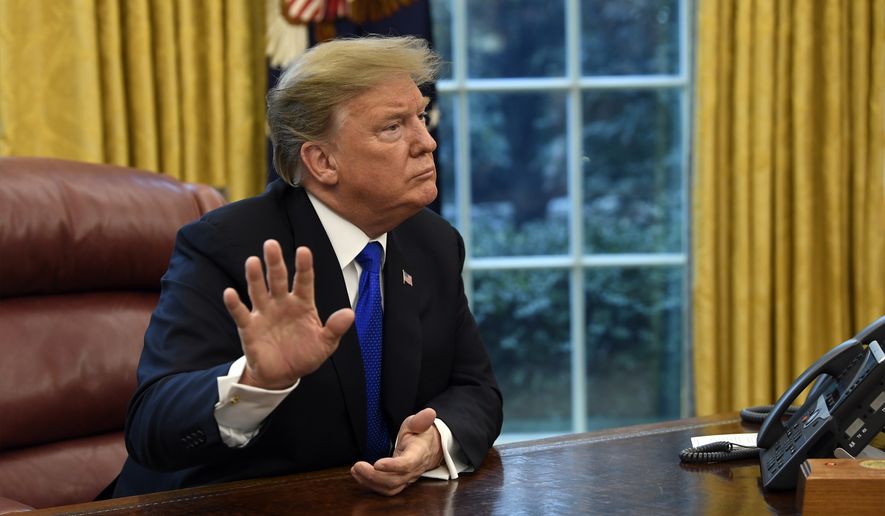Congress is barreling toward its first vote this week to try to overturn President Trump’s border wall building emergency declaration, with the odds favoring them winning the initial skirmishes but ultimately losing the fight on Capitol Hill.
Mr. Trump on Friday said he will “100 percent” veto any bill Congress does manage to pass blocking his emergency claims, and key Republicans said there’s more than enough GOP support in the House to sustain the president.
The president said he’s counting on that.
“Will I veto it? 100 percent,” Mr. Trump said.
House Speaker Nancy Pelosi, California Democrat, has set a vote for Tuesday on a resolution of disapproval of the president’s declaration. Mrs. Pelosi said they are working to get Republicans on board, saying they’re appealing to GOP members’ “patriotism.”
“It’s out of a respect for their respect for the Constitution that we invite them to join,” she said.
The resolution’s chief sponsor is Rep. Joaquin Castro, a Texas Democrat who said he began working on the legislation six months ago when talk of an emergency declaration heated up.
Mr. Trump had pushed Congress to approve $5.7 billion in wall construction money, but lawmakers instead gave him $1.375 billion.
The president signed that legislation, but also triggered several sections of law — including the National Emergencies Act — to identify $6.7 billion more money already in the budget he says he can redirect toward wall construction.
A handful of lawsuits have already been filed by environmental groups and a coalition of Democratic states, and Mrs. Pelosi said it’s possible Congress joins the legal fights as well.
But Congress has its own powers.
Under the Emergencies Act, Capitol Hill can pass a resolution of disapproval, which would effectively cancel a presidential emergency. If it clears both the House and Senate though, Mr. Trump’s promised veto would kick in.
Another option Democrats are pondering is to change the Emergencies Act itself — though that also would need to clear the Senate, and survive a presidential veto.
Rep. Doug Collins of Georgia, the ranking Republican on the House Judiciary Committee, said there aren’t enough votes to do either, because GOP lawmakers will sustain a presidential veto.
Mrs. Pelosi on Friday seemed to undercut at least part of the legal argument against the president’s actions when she said Mr. Trump would have powers to move money around to combat an emergency — if there were an actual wall emergency. She said the problem with this current declaration is that it’s a sham emergency.
Yet most legal scholars say courts are unlikely to peer too deeply into a president’s emergency declaration, figuring that’s a political question best left to him and Congress. The bigger question is whether Congress can, in theory, grant a president emergency powers to move around money at his whim — and there Mrs. Pelosi said Congress has done just that.
“Does the president have the right to do such a thing when there is a true emergency? Yes he does,” she said.
Still, Democrats are casting the vote as a major constitutional showdown that will test where Republicans come down.
“This is about upholding the oath of office that we take to protect and defend the Constitution,” Mrs. Pelosi said.
Republicans counter that was not the case when President Obama, after saying he didn’t have the power to unilaterally protect illegal immigrants, reversed himself and in 2012 announced the DACA program to impose a deportation amnesty for “Dreamers,” immigrants who came to the U.S. as children illegally.
Sen. Edward Markey, Massachusetts Democrat, said Sunday the difference is the proximity to Congress’s recent vote to only give him part of what he wanted for fence money.
“A president cannot use his executive authority — his emergency authority when none exists — when Congress just finished acting on it when they provided money for the president to provide additional security along the border,” he told CBS’s “Face the Nation.”
• Stephen Dinan can be reached at sdinan@washingtontimes.com.




Please read our comment policy before commenting.